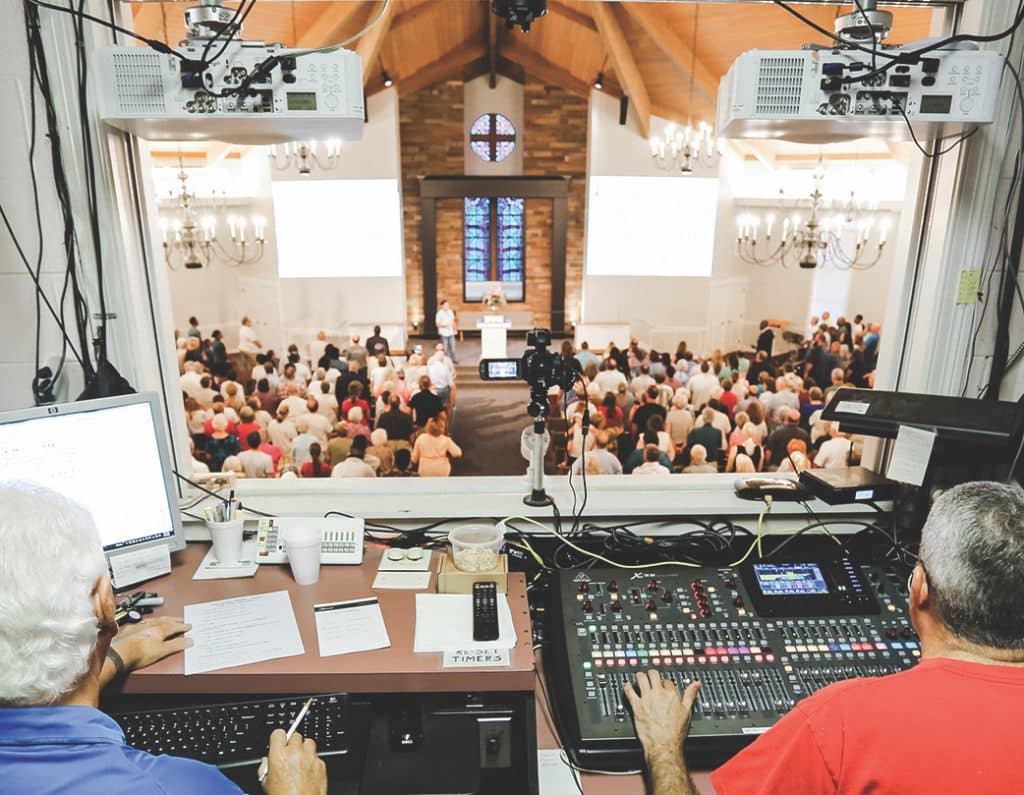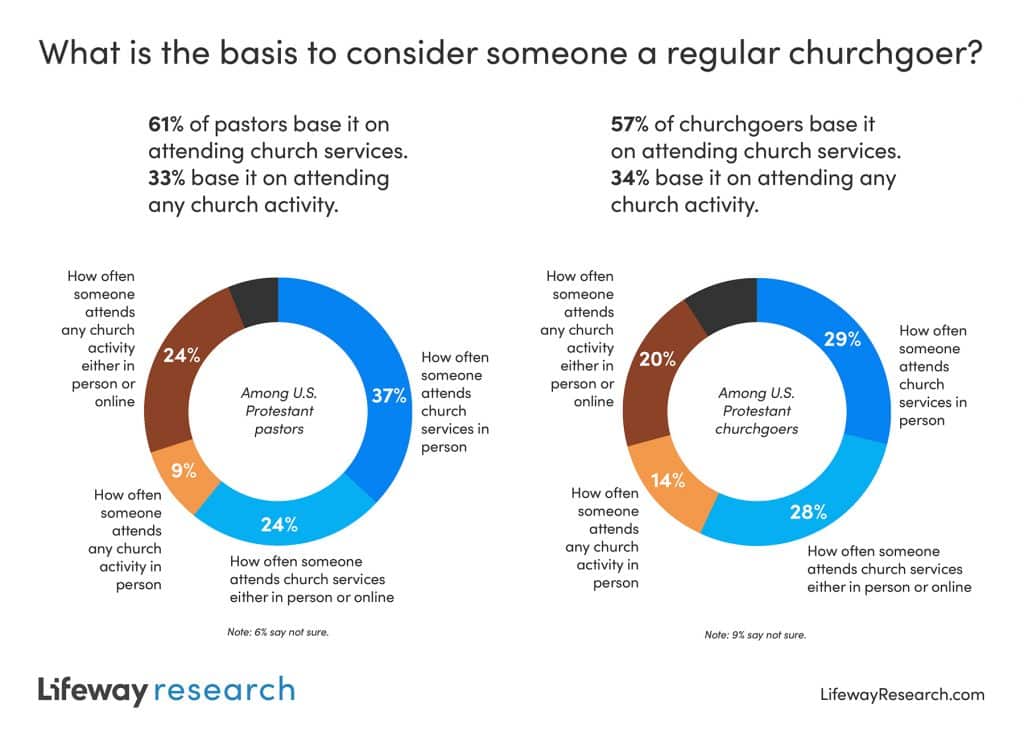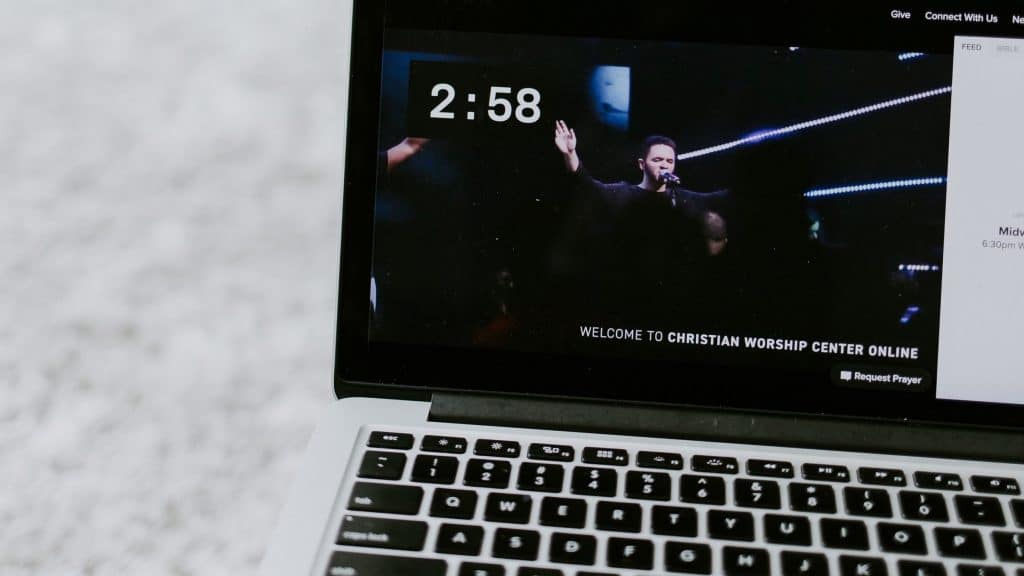With the rise in online church services, many have different opinions on the acceptability or validity of online church attendance for those with the ability to attend in person. Lifeway Research finds pastors and churchgoers split over the question. But other research projects may provide more clarity on tangible benefits that come exclusively from physical attendance.
During the pandemic, a shift happened among Americans in general and particularly among Americans with evangelical beliefs in reference to attending church, according to the State of Theology study. In early 2020, 58% of Americans said worshiping alone or with one’s family is a valid replacement for regularly attending church. By 2022, that number jumped to 66%. Among Americans with evangelical beliefs, the percentage increased from 39% in 2020 to 54% in 2022.
With these shifts, how likely are pastors and churchgoers to consider online attendance as an equal basis for measuring who qualifies as a regular churchgoer?
Pastors’ positions
Most pastors say attending the worship service is necessary to be considered a regular churchgoer. But they’re split over whether attendance must be in person or if online is an equally valid option.
A Lifeway Research study found most U.S. Protestant pastors (61%) use worship service attendance as the basis for considering someone a regular churchgoer, while 33% say any church activity will do. They’re more evenly divided over whether attendance must be in person or can include online worshipers.
Your tax-deductible gift helps our journalists report the truth and hold Christian leaders and organizations accountable. Give a gift of $30 or more to The Roys Report this month, and you will receive a copy of “Hurt and Healed by the Church” by Ryan George. To donate, haga clic aquí.

Around 46% set the standard for a regular churchgoer on in-person attendance of some kind (37% say church services and 9% say any church activity). Another 48% say online attendance qualifies someone, with 24% saying only a worship service and 24% including any church activity.
Younger pastors, those 18 to 44, are among the most likely to say a regular churchgoer is directly tied to in-person church service attendance (42%). They’re also among the least likely to say attending services in person or online both qualify (17%).
Hispanic (40%) and white pastors (38%) are more likely than African American pastors (17%) to say a regular churchgoer is determined by how often someone attends church services in person.
Pastors in the Midwest (44%) are more likely than those in the South (36%) or Northeast (33%) to point exclusively to attending services in person.
Evangelical pastors (45%) are close to twice as likely as mainline pastors (25%) to say a regular churchgoer is tied to how often an individual attends church services in person.
Denominationally, non-denominational pastors (53%), Baptists (47%), and Lutherans (44%) are among the most likely to say being a regular churchgoer is based on attending church services in person. Methodists (39%), Presbyterian/Reformed (38%), and Restorationist Movement pastors (35%) are among the most likely to include attending any church activity in person or online.
Churchgoer concerns
Among at least monthly churchgoers themselves, 57% say attendance at church service should count as the basis. And 34% include any church activity. Again, they’re more evenly split over the inclusion of online attendance.
Around 43% say a regular churchgoer is someone who attends in person, 29% tying it exclusively to worship service attendance and 14% to any church activity. For 48%, online attendance should count, including 28% who include only church service and 20% who say any church activity.

Denominationally, Baptists (35%) are among the most likely to base the standard on how often a person attends church services in person. Methodists (44%) are among the most likely to say it’s based on how often a person attends services in person or online.
Churchgoers with evangelical beliefs are more likely than those without such beliefs (33% v. 26%) to say regular attendance is based on attending church services in person.
In-person benefits
Regardless of one’s theological position on “online church,” recent studies have found the physical benefits often connected to church attendance are, at the very least, more closely connected to in-person attendance.

One study of American and Israeli smartphone users during the pandemic published in the Journal for the Scientific Study of Religion found positive effects of digital spirituality. It wasn’t enough to simply use a smartphone during the pandemic. But “smartphone use that satisfied religious or spiritual needs generated favorable outcomes.”
A study published in the Sociology of Religion journal, however, found in-person religious service attendance had benefits unmatched by virtual attendance. Researchers found that “while in-person religious attendance was associated with better mental and physical health, virtual attendance was not significantly related to either outcome,” according to a summary published at Religion Watch of the Baylor Institute for Studies of Religion.
The study found that as people increased their in-person attendance during the pandemic, they experienced lower levels of psychological distress and better self-rated health. The authors argued that in-person attendance could promote improved health through social support and a sense of connection in congregational worship. In-person churchgoers could also “leave religious services feeling a greater sense of emotional energy drawn from active participation in religious rituals.”
This article was originally published on LifewayResearch.com y ha sido reimpreso con permiso.
Aaron Earls is the senior writer at Lifeway Research.




















20 Respuestas
What about those of us that due to physical or other illnesses can’t make it but are faithful tithers and supporters of the church? Are you going to say that doesn’t make a difference? Than if that’s how a pastor or a member feels, maybe I or another person is dedicated to the, wrong church.
I don’t think pastors are speaking about you. They want people that CAN go to church in person to go in person, not to stay in pandemic mode. May you be blessed for your faithfulness and doing what you are able!
Thank you and God bless you.
Online church is important for people that cannot physically attend, or miss at times due to travel or illness.
Those that are physically able, should attend, fellowship and worship together in person. That is the New Testament model, which Christ modeled with His followers.
When we travel, we almost always attend church in the town or city we are visiting. It has often been a rich experience as we meet believers in different circumstances and from different backgrounds. We once found ourselves in a 100% Korean church, and we are not Korean! Thankfully, the worship songs and message were in English. Our siblings in Christ were very welcoming and amused at our presence!
We have experienced numerous divine encounters that would have been missed if we stayed in our hotel and watched our home church online.
There has been an increasing trend for “rock star pastors” to show up for the main performance but not actually pastor or disciple members. They behave more like a combination of Ringmaster of Ceremonies combined with profane late night entertainment. Many of these church leaders make up their own rules for themselves. They don’t follow biblical mandates for pastors and have with minimal accountability to their congregation or their board of elders, if their church even has such a structure. This frequently includes ignoring the biblical mandates for the character requirements for a pastor.
Given these things, is it any wonder that so many church members have followed the lead of these pastors, and now behave more like the audience watching the pastor’s show, either live or livestreamed, and ignore the biblical mandates for worship?
Does going to an auditorium with a bunch of strangers and perhaps a few acquaintances to watch a short concert and listen to a lecture really constitute the vision of what church is meant to be? Since this activity is primarily spectator focused, does my physical location even matter? Perhaps we need to revisit the purpose of church and how it manifests itself in our lives.
Amen. My feelings exactly. I call it the Cotton candy gospel.
amy,
Why go to that kind of church? There are plenty of small and medium churches with true fellowship, personal interaction with the elders and pastors, opportunities for service, and small groups to get to know people better.
I’m not convinced this is a small church/big church issue. It’s just more pronounced in the big churches. I go to a small church. I have the same surface level conversations with the same same few people before and after the weekly concert-lecture. Everyone except for a small handful is still just a spectator being entertained. I quit going to Sunday school because they rely heavily on the materials produced by the big organizations and there’s no true interaction. I don’t need to go to the church building to watch a video of a Christian celebrity telling me what he or she thinks. In my small church, the pastor and elders do actually know the congregants personally, so I suppose that’s an advantage over the big churches.
I think the question we need to ask is if the vision of church is mutual community or hierarchical institution. A small hierarchical institution is still a hierarchical institution.
It has been so ingrained in our culture that “church” is this weekly performance that we don’t know what authentic church really is. Perhaps we need to carefully examine our own status quo bias.
amy,
Thanks for your response.
Do you take sermon notes and try to apply the passage to your life? Do you serve? Are you in a small group that holds each other accountable to grow in Christ and shares what is going on in your lives? Do you invite others out to lunch to discuss the sermon? Do you help people in need in your congregation? Do you stir others up to love and good works? Are you mentoring a younger person, or newer believer? Do you sing praises to the Lord? Who is the iron you are sharpening, and who is sharpening you? Do you break bread with others in your church body in your or their home? Are you using your spiritual gifts to bless others? Are you involved in evangelism and missions?
Have you spoken with any elders about your concerns and ideas?
The biblical church is both a mutual community and hierarchical – assuming the latter to mean “leadership.” The bible prescribes both.
One O,
Parte 1
Perhaps you could give examples of how you are fulfilling all of the questions you have for Amy K? Instead of deflecting from the core issues that the church leaders do not practice what they preach, or follow the requirements of service to God, do not have the Commandments as the foundation of their behavior, generally do not allow for any scriptural discussion that runs counter to their POV, and do not provide an atmosphere that promotes getting to know the community.
As for sermon notes, or discussion of the sermon, my experience from the pastors I have exposed myself and family to over the past few years goes as follows:
A declaration of what the congregation is guilty of, 2 or 3 verses from different books that do not reference solutions given by Jesus on the subject, then 45 minutes of the pastors talking about themselves and the company they keep or the vacation they went on. Then afterwards everyone runs off to watch football, or whatever family plans they have, are not interested in having a discussion based in scriptural truth, and the elders/pastor/congregation will get angry if you dare bring up a scriptural reference question that does not align with the sermon.
Parte 2
I recently took my family to a small free evangelical church in my area. The service consisted of singing, a brief reference to half a scriptural passage, a video production of the church (pictures of the building and smiling people, plus a reference to whoever made the video, and a church higher up the food chain), the sermon was the playing of a podcast of a man pretending to be God (reassuring a man concerned about the government collecting information on him that the government would be jealous of the information that God has on us and is not a concern), then another song, and then food.
Nobody was interested in discussing anything related how we could be serving God, or the difficulties Christians are facing and how we are to resolve them in a Biblical manner. The elders were not open to any inquiries about the lack of scripture reading or how we can better serve our fellow man/women/children.
There’s an old saw that if the twelve apostles came back from the dead and went to church, the only thing they would still recognize after all these years would be the pastor’s jokes. It’s true. These megachurches have about as much to do with Biblical corporate worship as Congress does with democracy.
clearly online service can be a blessing to the infirmed and elderly. however everyone else should attend church in person. the church cannot be the church for you when you’re isolated at home.
It used to be if you were a senior and/or disabled the church would visit you and/or call you. Now there’s nothing unless you make contact. Sometimes I feel hurt as I feel they’re only interested in the money. As a senior citizen with mobility issues I make sure my tithes get in there. But you don’t get the feeling anyone cares. It’s sad as church is such an important connection or at least it used to be.
“however everyone else should attend church in person. the church cannot be the church for you when you’re isolated at home.”
That runs counter to everything the church leaders and most of the congregations have been saying for the past 2 years. They told the people that wanted to attend that it did not matter if it was in person or online, now they are trying to reverse that lie. The churches cannot have it both ways, they picked a path the runs counter to the teachings of Jesus, and now are reaping what they sowed.
If some from the parish are home bound, then there should be outreach where some volunteers/elders/lay pastors/ or pastors not giving sermons on that day, go from the church, and watch the service with these people not able to share the gospel with others as a group. If you believe your church is open to that idea, try setting up a house visit service ministry and see how far you get.
I find it hard to attend church these days, when my town has only Catholic or Mega Church structures. Who can be blessed by travelling to see a celebrity pastor who couldn’t be bothered to dress for church any better than a pair of jeans, a T-shirt and sneakers, while his power couple wife dresses in designer fashion.
I must be old school. About 2000 years book of Acts old school in my thinking.
In early 2020, 58% of Americans said worshiping alone or with one’s family is a valid replacement for regularly attending church. By 2022, that number jumped to 66%. Among Americans with evangelical beliefs, the percentage increased from 39% in 2020 to 54% in 2022.”
Churches chose to close their doors, implement remote attendance, claimed it was the same as attending in person, and are now upset that people took them up on their offer. The churches made their bed when they served man, not God, a lot of people finally woke up to the hypocrisy and moved on to home church/Bible study groups. I have yet to see one church come out, apologize, say we made a mistake, learned from it, we ask for forgiveness, and will do better in serving God, not ourselves.
If the question is what counts as “going to church,” then the people who are actually “going” are the church goers. I don’t say I’m “going to a movie” when watching Netflix at home.
The majority of the pastors I have known over the years care more about regular church givers rather than goers. Agree with Andrew, churches lost all credibility with their COVID response. At the church I was a member, we were told “the church is not a building” (just as they started a new $20 million building campaign) and “ you are deployed”, just as COVID hit and they locked their doors. Now, the messaging is “come back home”. As a saved member of the Body of Christ, I now realize that religion and churches are not of God, but purely of Man. They are just another cog in this present and evil world.